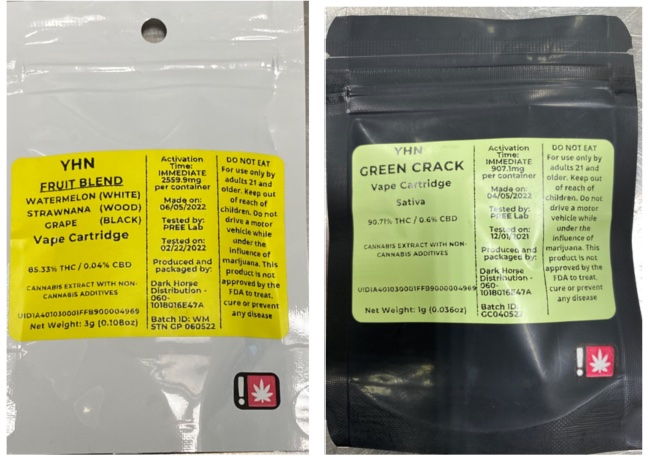
Oregon recalls 18,000 THC vapes. Is yours one of them?
Oregon has issued a recall of more than 18,000 vape cartridges. This is how you can determine whether your shopping cart has been recalled.
Earlier this month, investigators from the Oregon Liquor and Cannabis Commission (OLCC) discovered that more than 18,000 THC vape cartridges sold in Oregon between November 2021 and July 2022 contained an unauthorized non-cannabis additive that causes respiratory illness can.
The OLCC has issued a recall on these cartridges, which were manufactured by YHN and sold at two stores in the eastern Oregon city of Ontario.
Weedology and The Bud House, the two Ontario dispensaries that sold the vape cartridges, voluntarily removed the recalled YHN products from their shelves.
To date, the OLCC has received no reports from consumers of adverse health effects as a result of using these YHN products.
All consumers who have purchased the unauthorized products are requested to return them to an OLCC licensed retailer or to destroy the product. Those who have health concerns about the recalled vaping products should contact their doctor.
Here’s what the labels on the recalled vape carts look like:

The culprit: soybean oil
During their ongoing independent investigation, OLCC officials tested a number of YHN-branded products and found that some of their flavored inhalable cannabinoid cartridges may have contained soybean oil. Soybean oil contains triglycerides which are banned in vape products
in Oregon.
Soybean oil is classified as a Generally Recognized Safe (GRAS) food additive by the US Food & Drug Administration. However, this classification is based on oral ingestion, not inhalation. When soybean oil is heated into a vapor and inhaled, the triglycerides in soybean oil can cause a variety of long- and short-term health problems, including lipoid pneumonia, a rare form of the lung disease that leads to pneumonia and breathing problems.
Related
Vape Pen Lung Injury: Here’s What You Need to Know
The risk: lipoid pneumonia
According to the National Institutes of Health, cases of lipoid pneumonia have increased with increases in both nicotine and THC vaping.
“Vaping is defined by the use of electronic cigarettes that produce inhaled aerosols by heating a liquid…consisting of oils containing a variety of chemicals, including but not limited to nicotine, artificial flavors, and/or cannabis,” according to an NIH Guide last updated in June 2022. “A case series conducted in North Carolina … evaluated 5 cases in July and August 2019 of previously healthy individuals with no underlying comorbidities, all of whom had shared exposure to vaporized aerosols and suffered from acute hypoxic respiratory failure requiring hospitalization.”
The 2019 EVALI vape lung outbreak, which killed 60 people and hospitalized more than 2,800, was caused by illegally marketed THC vape cartridges containing vitamin E oil. This oil had been approved by the FDA for a variety of products – but not for inhalation as a vapor. In the wake of the EVALI outbreak, Oregon and some other legal cannabis states have introduced strict rules banning certain additives such as vitamin E oil, squalene and propylene glycol in cannabis vape cartridges.
The health risks associated with soybean oil inhalation have also been observed in food flavoring and manufacturing plants. In 2002, a mysterious outbreak of bronchiolitis obliterans occurred in a microwave popcorn factory. In an investigation by the CDC, officials found that the factory workers’ lung problems were a result of inhaling the aerosol byproduct of heated soybean oil.
Other penalties depend on intent
In the OLCC’s review of YHN vape cartridges, which came in flavors like Fruit Blend and Green Crack, independent testing confirmed the presence of components consistent with those in soybean oil, a banned vape ingredient in the state Oregon, and were found that YHN’s labeling was only partially compliant with Oregon’s regulations for inhalable cannabinoid products.
The ingredient lists of the recalled YHN vapor product included the artificial flavors and properly categorized their product under OLCC rules. But YHN didn’t further break down the ingredients in their artificial flavors to reveal the existence of soybean oil, as required by the OLCC.
YHN faces a $4,950 fine or the cancellation of the company’s cannabis license. These are two very different outcomes and the penalty may depend on the OLCC’s decision as to whether ingestion of the prohibited additive was an intentional violation or an unintentional oversight.
Alex Peters
Alexa Peters is a freelance writer specializing in music, writing, travel, feminism and self-help. Her work has appeared in The Washington Post, Paste, The Seattle Times, Seattle Magazine and Amy Poehler’s Smart Girls.
Check out Alexa Peters’ articles
By submitting this form, you are subscribing to Leafly news and promotional emails and agreeing to Leafly’s Terms of Service and Privacy Policy. You can unsubscribe from Leafly email communications at any time.

Post a comment: